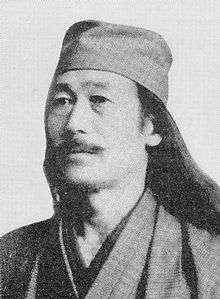Freedom and People's Rights Movement
The Freedom and People's Rights Movement, Liberty and Civil Right Movement, or Free Civil Right Movement (自由民権運動, Jiyū Minken Undō) (abbreviated as Freedom Party (自由党, Jiyūtō)[1]) was a Japanese political and social movement for democracy in the 1880s. It pursued the formation of an elected legislature, revision of the Unequal Treaties with the United States and European countries, the institution of civil rights, and the reduction of centralized taxation.[2] The Movement prompted the Meiji government to establish a constitution in 1889 and a diet in 1890; on the other hand, it failed to loosen the control of the central government and its demand for true democracy remained unfulfilled, with ultimate power continuing to reside in the Meiji (Chōshū–Satsuma) oligarchy because, among other limitations, the Meiji Constitution enfranchised only men who paid a substantial amount in property taxes, as a result of the Land Tax Reform in 1873.
Related people
- Chiba Takusaburō, author of the "Itsukaichi constitution" (五日市憲法), a draft constitution for the Empire of Japan
- Etō Shinpei
- Fukuda Hideko
- Gotō Shōjirō
- Ido Reizan
- Inoue Kaoru
- Itagaki Taisuke, founder of the first Jiyūtō, and former leader of the Jinshotai
- Yamamoto Yae
- Nakae Chōmin
- Ōkuma Shigenobu
- Shimizu Shikin
- Soejima Taneomi
- Yamaji Motoharu, former Jinshotai commander
- Tokutomi Sohō
- Ueki Emori
- Azenbō Soeda, prolific enka lyricist and street performer
- Saionji Kinmochi, one of the last Meiji period democrats, who later tried to prevent the Tripartite Pact
See also
| Wikimedia Commons has media related to Freedom and People's Rights Movement. |
- Liberalism in Japan
- Japanese dissidence during the Shōwa period
References
- Sims, Richard (2001). Japanese Political History Since the Meiji Renovation 1868-2000. Palgrave Macmillan. ISBN 0-312-23915-7.
- Buruma, Ian (2003). Inventing Japan, 1853–1964. Modern Library. ISBN 0-679-64085-1.
- "Quickening of the people's right movement", Matsuoka, Kiichi (Japanese)
- Soeda, Azenbō. A Life Adrift. Routledge. ISBN 9780415592161.

